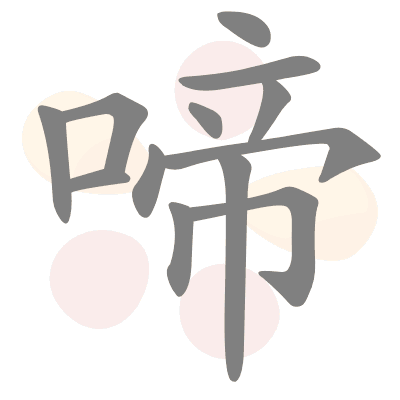啼
啼
char. cry, weep aloud; (of certain birds and animals) crow, hoot
| 80% | 120% |
Register to get less ads.
Registration is free and once you are registered you use this word in your private vocabulary lists.
Then you can train your own vocabulary either here or using one of our applications for PC, iOS or Android.
Registration is free and once you are registered you use this word in your private vocabulary lists.
Then you can train your own vocabulary either here or using one of our applications for PC, iOS or Android.
 |
Simplified stroke orders are based on the 'Standard of National Commonly-used Mandarin Chinese Characters (现代汉语通用字笔顺规范)', issued by the China National Language and Character Working Committee (国家语言文字工作委员会) on April 7th 1997. Traditional stroke orders are based on information issued by the Taiwan Ministry of Education.
啼 啼 idiom. not to know whether to laugh or cry |
两 兩 phr. With monkeys' sad adieus the riverbanks are loud (from the poem "Leaving The White Emperor Town at Dawn" by Li Bai, translated by Xu Yuanchong) |
猿 猿 phr. monkeys cry and wolves roar |
哭 哭 v. weep endlessly |
一 一 phr. One mourning turtle-dove is croaking on the power line. |
毗 毗 phr. (ancient Chinese) One have live too near a wood to be frightened by owl. |







